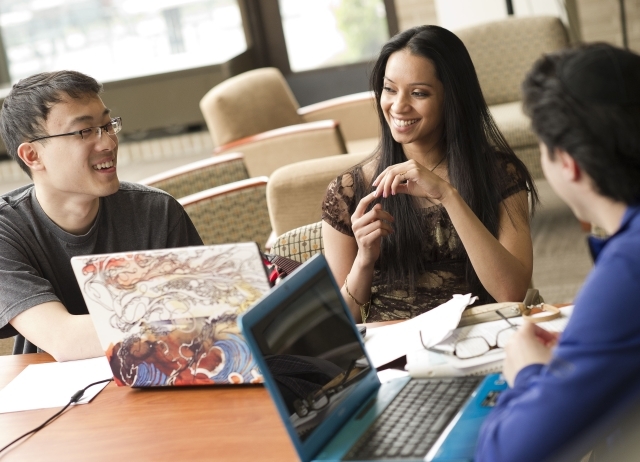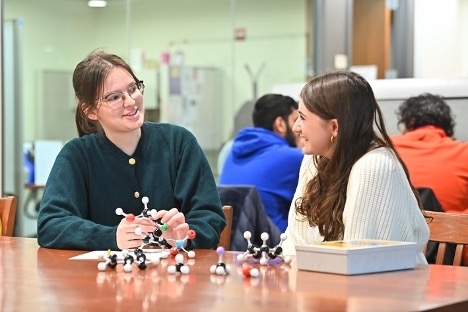

University Learning Commons (ULC)
- Home
- Life at St. John's
- Student Success
- University Learning Commons (ULC)
What is the ULC?
As part of the Center for Student Success, the University Learning Commons (ULC) provides FREE academic support through peer and professional tutoring in many subjects. Services are offered both in-person and virtually! Our tutors are typically upper-class students, who have excelled in the very courses/topics that they tutor. In addition, we provide discussion group opportunities which are focused on study skills, time management, organizational skills and other skills to help support students of all grade levels as they work towards their educational goals.
Students can also schedule to meet 1:1 for an Academic Strategy Session with a member of our team, to help improve on various soft skills including: study skills, organization, improving college reading, motivation etc.
Additionally, through our partnership with NetTutor, students can receive virtual HW Help or Tutoring for specific subjects. These subjects include: Accounting, Biology, Business, Business Analytics, Chemistry, Computer Science, Economics, Finance, Math, Nursing and Psychology! Some subjects also offer drop-in sessions or are available for appointments 24/7.
Please also check out our quiet areas for students to work as well as group rooms, which can be reserved for study or group projects for four or more students. We hope to see you soon!
Enroll in our ULC/NetTutor Canvas Course for Virtual Drop-In and Appointments

What Subjects do you Offer?
- Biology
- Chemistry (general and organic)
- Economics
- Math
*These are our core subject offerings; however, you can access our ULC widget to find out about the other subjects that are available. We have 50+ Tutors who can provide support in various subjects!
Please visit the ULC widget on your SJU SSO (single sign-on) dashboard.
Office Hours
The University Learning Commons (ULC) offers both in-person and virtual tutoring sessions for the convenience of our students. Both options provide students with the support and confidence needed for academic success. We look forward to assisting you on your academic journey!
Monday–Thursday
9 a.m.–4 p.m. (In-person & virtual appts.) *last appointment 3:00 pm*
5–9 pm (Evening online in a few subjects)
Friday
9 a.m.–3 p.m. (In-person & virtual appts.)
Sunday
5–9 p.m. (Evening online in a few subjects)
*Students can also walk-in during our above hours to see if a tutor is available!
**For the most updated office hours, please visit our online appointment website by clicking on the ULC widget on your single sign-on dashboard.
***NetTutor is accessible 24/7 to make appointments for many subjects. Use our link for drop-in or to schedule your appointment.
Office Location and Contact
The ULC is located in St. Augustine Hall (Library), Room 103 next to Einstein Bagels. Please note that students must have their storm cards in order to enter this space.
Tel: 718-990-1367
Director: Alexandra Marquez
Email: [email protected]
ULC email: [email protected]
Additional Information
Please visit the ULC widget on your SJU SSO (single sign-on) dashboard.
If you are interested in tutoring, come see us in the ULC (Located in St Augustine Hall, Room 103). You may click on the link below for an application, or you can pick one up in the ULC.
Tutor Application (PDF)
Is tutoring free?
All tutoring services are FREE for St. John's students.
Who will be tutoring me?
The tutors in the ULC are highly qualified. Below are some examples of our tutor's sucesses.
- An accounting tutor is a member of the President’s Society.
- A senior biology/chemistry tutor was awarded a full scholarship in the Ph.D. Neurobiology program at the University of Chicago.
- A physics/math tutor has been admitted to the Stanford University Master of Science Degree program in Aeronautics and Astronautics.
- A senior tutor has been accepted into the Ph.D program in chemistry at Carnegie Mellon University
- A senior biology/chemistry tutor has been accepted into the Ph.D program in the Department of Chemistry at the University of California, Irvine.
- A senior organic chemistry tutor has accepted a position in the Ph.D program in the Department of Chemistry at the Univeristy of Illinois at Urbana-Champaign, as a Virgina Bartow Scholar. In addition, this tutor is a winner of St. John's University SHinE award (Students Honored in Employment) for excellence in tutoring.
All tutors in the ULC must have at least a 3.8 GPA and are required to submit two letters of recommendation from their professors in the subject area they tutor. Most tutors are upperclassmen students, but there are several graduate tutors.
How do I cancel an appointment?
You can cancel an appointment online (click on your appointment and click the "Cancel Appointment" tab at the bottom), you can call 718-990-1367, or you can drop in to inform us. It is important to cancel your appointment if you cannot keep it so another student can be helped.
What if there are no appointments available during the times I am available?
If there aren’t available tutors, please click our ULC Tutor Unavailability Form to let us know. Someone from our team will reach out to try to assist you in finding a different time slot or provide information regarding available options through ULC/NetTutor.
How many appointments can I have per day?
You may have one appointment per day, per subject. (i.e. You can have an appointment for Theology 1000C AND an appointment for Chemistry 1120 on the same day, but you cannot have two Chemistry 1120 appointments.)
May I bring another student with me to my appointment?
Yes, if the student is in the same class as you and needs help. Most of the tutors in the ULC can accommodate up to four (4) students.
Must I have an appointment to receive tutoring in the ULC?
The ULC offers walk-ins depending on tutors' availability.
Accounting:
Chemistry:
- Periodic Table and Reference Tables
- Molar Mass Calculator
- How to Prepare for Your General Chemistry Exams
Math:
- For help with step-by-step solutions to problems.
- For help with Algebra, Geometry, Calculus, and many other areas of mathematics
Philosophy:
- The Stanford Encyclopedia of Philosophy organizes scholars from around the world in philosophy and related disciplines to create and maintain an up-to-date reference work.
- An encyclopedia of philosophy articles written by professional philosophers.
Physics:
